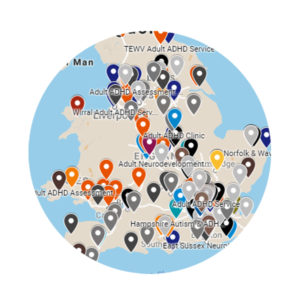Researchers at the University of Exeter have released a map put together from the results of a national survey. The new map aims to help identify existing services and gaps in provision for young adults with Attention Hyperactivity Deficit Disorder (ADHD).
More than 2,500 young people, parents, health workers and UK commissioners provided information on services for adults with ADHD in their area, early in 2018. The survey responses have been used to create a map of existing adult ADHD services in the UK, which is now live.

Once considered to be a condition restricted to childhood, there is clear evidence that ADHD persists into adulthood for many young people, with the National Institute for Health and Care Excellence recently formalising its status as a long-term condition. Despite this, little is known about how many areas in the UK have specialist services for adults with ADHD, and how many young people need to move to them once they are too old for children’s services.
Anna Price, Associate Research Fellow working on the Children and Adolescents with ADHD in Transition between Children’s and Adult’s Services (CATCh-uS) project, said: “For adolescents who need to transition into adult services, this change comes at a crucial and vulnerable time, when multiple other changes are happening such as moving on to higher education, starting work or changing home. If adult ADHD services are not available, or importantly, if the young person, their parent or carer, or clinician do not know about local adult ADHD services, this young person may slip through the net and stop receiving the support they need. It is therefore imperative we improve awareness of ADHD service provision nationally.”
The CATCh-uS Mapping Survey is being implemented by researchers from the University of Exeter Medical School to tackle these issues head-on, and help inform future service development.
The survey is part of the wider CATCh-uS project, which focuses on what happens to young people with ADHD when they are too old to stay within children’s services. It aims to establish how many young people with ADHD are in need of services for ADHD as adults, and investigate young peoples, parents and practitioner’s views about the transition process.
The Mapping Survey of the CATCh-uS Project is funded by the National Institute for Health Research, and is being run in collaboration with the Royal College of Psychiatrists and ADHD support groups: AADD-UK, ADHD foundation and UK Adult ADHD Network.
For more details view the map.
This is an independent article and the views are not necessarily those of ACAMH.


